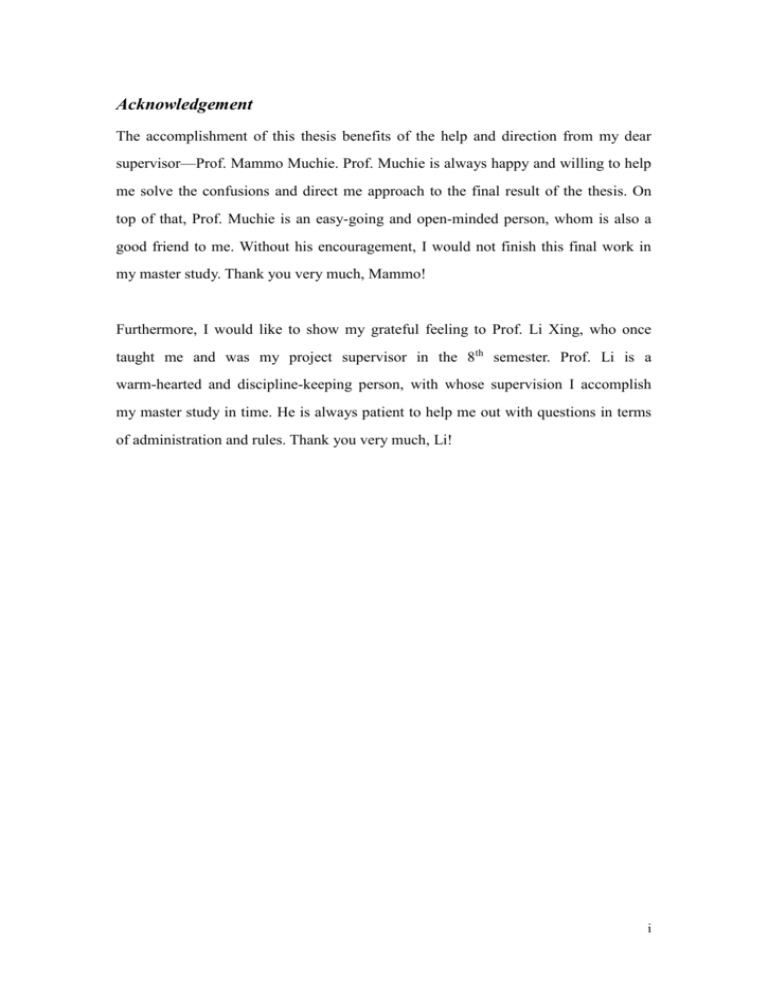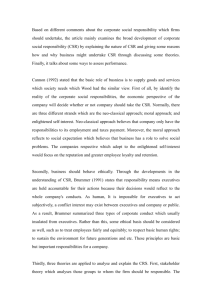Acknowledgement
advertisement

Acknowledgement The accomplishment of this thesis benefits of the help and direction from my dear supervisor—Prof. Mammo Muchie. Prof. Muchie is always happy and willing to help me solve the confusions and direct me approach to the final result of the thesis. On top of that, Prof. Muchie is an easy-going and open-minded person, whom is also a good friend to me. Without his encouragement, I would not finish this final work in my master study. Thank you very much, Mammo! Furthermore, I would like to show my grateful feeling to Prof. Li Xing, who once taught me and was my project supervisor in the 8th semester. Prof. Li is a warm-hearted and discipline-keeping person, with whose supervision I accomplish my master study in time. He is always patient to help me out with questions in terms of administration and rules. Thank you very much, Li! i Abstract Corporate Social Responsibility (CSR) as an American academic concept has already been discussed for more than four decades in the academic field and adopted by the corporations in the developed countries for more than 20 years. Now it is blossoming in China, which has become an important part of the supply chains for the capitalist world system. Under the international context and the domestic context, the four major players in CSR implementation—the Chinese government, the subsidiaries of TNCs in China, the SOEs and the NPOEs—have different understandings and performances in reality. In this thesis, I am going to explore how do the four players understand CSR by asking two questions: 1. How does the Chinese Government understand CSR and what policies does it issue? 2. How do the Corporations in China (SOEs, NPOEs and subsidiaries of TNCs in China) react and perform in CSR implementation? ii Abbreviation CSR Corporate Social Responsibility UN United Nations ILO International Labour Organization WTO World Trade Union TNCs Transnational Corporations SOEs State-Owned Enterprises NGOs Non-Governmental Organizations SAI Social Accountability International SA 8000 Social Accountability 8000 ISO International Organization for Standardization NPOEs Non-Public Owned Enterprises FDI Foreign Direct Investment PRC People’s Republic of China GDP General Domestic Product AA 1000 Account Ability standards 1000 series SR Social Responsibility OECD Organization for Economic Cooperation and Development CPC Communist Party of China CSPGP China Society for Promotion of Guangcai Program SMEs Small-Medium Sized Enterprises RMB Renminbi SGCC/ SG State Grid Corporation of China ACFTU All China Federation of Trade Unions CNCP China National Petroleum Corporation iii Content Acknowledgement……………………………………………………………………i Abstract………………………………………………………………………………ii Abbreviations………………………………………………………………………..iii Chapter 1 Introduction 1.1 Background 1.1.1 Background of CSR Under the International Background………………………….……1 1.1.2 Background of CSR in China…………………………………………………………….4 1.2 Problem Formulation…………………………………………………………………….……..7 1.3 Methodology……………………………………………………………………………………8 1.3.1 Information and Data Collection…………………………………………………………9 1.3.2 Theory Study…………………………………………………………………………….11 1.4 Chapter Introduction…………………………………………………………………………..14 Chapter 2 Theory Reviews 2.1 Overview of CSR……………………………………………………………………………..15 2.2 Milton Friedman’s View on CSR……………………………………………………………..16 2.3 R. Edward Freeman’s Stakeholder Theory……………………………………………………19 2.3.1 The Notion and History of Stakeholder Approach………………………………………19 2.3.2 Process of Stakeholder Management……………………………………………………21 Stakeholder Analysis for Enterprise Strategy…………………………………………..22 Values Analysis for Enterprise Strategy………………………………………………..22 Social Issues Analysis for Enterprise Strategy………………………………………….23 Chapter 3 Empirical Part 3.1 The principles from the International Organizations………………………………………….25 3.2 The Policies or Reports from Chinese Central and Local Governments……………………..27 3.2.1 Policies and Guidelines from CPC and the Central Government……………………….28 Policies towards FDI…………………………………………………………………….28 The 11th Five-Year Plan and Harmonious Society……………………………………….28 Amendment of the Law on Employment Contract………………………………………29 Amendment of Company Law of PRC…………………………………………………..30 Guangcai Program………………………………………………………………………..31 3.2.2 Report from Jiaxing City Government, Zhejiang Province……………………………31 Self-Awareness of CSR………………………………………………………………..33 Public Perception of the CSR Implementation in NPOEs……………………………..33 Factors that Affect CSR Implementation by NPOEs…………………………………...35 3.3 CSR Implementation in Both Local Corporations and TNCs in China……………………….36 3.3.1 TNCs’ Case Study—Wal-Mart…………………………………………………………..38 iv 3.3.2 CSR Understanding by Chinese Corporations………………………………………….40 SOEs’ Understanding and Performance………………………………………………..40 NPOEs’ Understanding…………………………………………………………………41 Chapter 4 Analysis 4.1 The Government’s and the CPC’s Understanding of CSR…………………………………….42 4.1.1 The External and Internal Factors That Affect the Government’s Attitude of CSR…….42 4.1.2 The Measures Adopted by the Government on CSR Implementation…………………..44 4.2 The Subsidiaries of TNCs’ Understanding of CSR………………………………45 Wal-Mart Case Study…………………………………………………………….46 4.3 The SOEs’ Understanding of CSR……………………………………………….47 4.4 The NPOEs’ Understanding of CSR……………………………………………..49 Chapter 5 Conclusion………………………………………………………………50 Reference……………………………………………………………………………54 v







